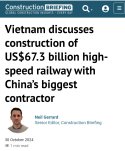The Philippines not joining BRICS because the United States would not allow it could present a few potential disadvantages for the country. It would be akin to missed economic opportunities for PH.
BRICS is an economic bloc of emerging markets that offers trade opportunities, reduced tariffs, and joint projects among member countries. By not joining, PH misses out on direct access to potential investments and partnerships within BRICS countries. Likewise, BRICS countries may form preferential trade agreements that favor member countries, potentially putting non-member countries like PH at a disadvantage regarding tariffs and trade policies. This could limit the Philippines' access to emerging markets in BRICS countries, impacting its trade competitiveness.
BRICS now has its own New Development Bank (NDB), which provides an alternative to institutions like the World Bank and the International Monetary Fund (IMF) for funding large infrastructure and development projects. PH not being part of BRICS means it won't have direct access to this source of financing, which could be beneficial for infrastructure and economic growth projects. Also, BRICS represents a coalition that challenges the dominance of Western-centric international bodies. By not joining, PH might miss an opportunity to influence global governance from a non-Western perspective, which could align more closely with its own development goals and regional interests.
In addition, BRICS represents a challenge to the traditional Western-led economic order, which could offer PH an alternative path in global alliances. Not joining might limit the Philippines' ability to maneuver diplomatically between the West and emerging powers, impacting its strategic autonomy, especially given its strategic position in Asia and involvement in the South China Sea disputes.
Furthermore, aligning with BRICS countries diversifies foreign policy, balancing relationships with both Western and non-Western powers. Without BRICS membership, the Philippines might appear more reliant on Western alliances, potentially reducing its leverage in negotiations with both Western and Eastern blocs.
These factors highlight the strategic importance of BRICS for PH. Membership in BRICS could significantly bolster the country's global standing and unlock economic opportunities through a diversified network of alliances and development resources. However, without true independence, sovereignty, and a shift away from its semi-colonial alignment with the United States, particularly under the influence of its existing military agreements (MDT), PH may continue to forfeit the full advantages that BRICS membership could offer. This reflects the challenging reality that the Philippines, under the current political regime and geopolitical constraints, may struggle to fully leverage BRICS as a pathway to autonomous development and a more balanced global stance.
....
"High time PH joined Brics"
.....
"PH warned on joining BRICS: US won’t allow us to do it"
BRICS is an economic bloc of emerging markets that offers trade opportunities, reduced tariffs, and joint projects among member countries. By not joining, PH misses out on direct access to potential investments and partnerships within BRICS countries. Likewise, BRICS countries may form preferential trade agreements that favor member countries, potentially putting non-member countries like PH at a disadvantage regarding tariffs and trade policies. This could limit the Philippines' access to emerging markets in BRICS countries, impacting its trade competitiveness.
BRICS now has its own New Development Bank (NDB), which provides an alternative to institutions like the World Bank and the International Monetary Fund (IMF) for funding large infrastructure and development projects. PH not being part of BRICS means it won't have direct access to this source of financing, which could be beneficial for infrastructure and economic growth projects. Also, BRICS represents a coalition that challenges the dominance of Western-centric international bodies. By not joining, PH might miss an opportunity to influence global governance from a non-Western perspective, which could align more closely with its own development goals and regional interests.
In addition, BRICS represents a challenge to the traditional Western-led economic order, which could offer PH an alternative path in global alliances. Not joining might limit the Philippines' ability to maneuver diplomatically between the West and emerging powers, impacting its strategic autonomy, especially given its strategic position in Asia and involvement in the South China Sea disputes.
Furthermore, aligning with BRICS countries diversifies foreign policy, balancing relationships with both Western and non-Western powers. Without BRICS membership, the Philippines might appear more reliant on Western alliances, potentially reducing its leverage in negotiations with both Western and Eastern blocs.
These factors highlight the strategic importance of BRICS for PH. Membership in BRICS could significantly bolster the country's global standing and unlock economic opportunities through a diversified network of alliances and development resources. However, without true independence, sovereignty, and a shift away from its semi-colonial alignment with the United States, particularly under the influence of its existing military agreements (MDT), PH may continue to forfeit the full advantages that BRICS membership could offer. This reflects the challenging reality that the Philippines, under the current political regime and geopolitical constraints, may struggle to fully leverage BRICS as a pathway to autonomous development and a more balanced global stance.
....
"High time PH joined Brics"
.....
"PH warned on joining BRICS: US won’t allow us to do it"

